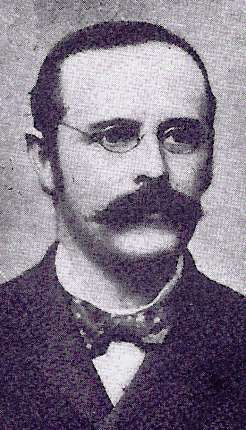Francis William Maxwell
- Born 7 December 1863 at Bury
- Died 13 August 1941
Francis William Maxwell, usually known as Frank, was the second son of James Maxwell. He was born in Bury on 7 December 1863. and was educated at the Friend's School in Kendal and then at Owen's College, Manchester. In the late 1880s he joined his father's practice and was made a partner.
Both the original partners, William Charles Tuke and James Maxwell died a few months apart in 1993 leaving Francis William Maxwell as the sole remaining partner. With the assistance of several long-serving assistants including Arthur Mattinson, he determined to continue. Nonetheless he was forced to issue a notice in the Manchester Times of 13 October 1893 informing the public that the practice would be continuing with the same staff and under the same name. This decision would relegate him to relative obscurity. Although he was senior partner in the practice for more years than his father, it is still the founding partners who generally receive most of the credit even for works post-1893. On the death of his father, Frank Maxell’s most urgent task was the completion of Blackpool Tower. The ironwork of the tower itself, which measured 518 feet 9 inches to the top of the flagstaff, was then complete, but the buildings at the base, which included a circus positioned within the four legs of the tower, were still under construction and were not finished until late 1894, and thus after the official opening day of Whit Monday 14 May 1894.
Such was Blackpool Tower's commercial success that almost immediately a site in New Brighton, Wallasey, was secured by the New Brighton Tower and Recreation Company for an even bigger structure. Maxwell and Tuke began work on the plans in July 1895 and the New Brighton Tower was built during 1897–8, opening—albeit incomplete—at Whitsun 1898. At 567 feet 6 inches the New Brighton Tower outdid Blackpool's by 48 feet 9 inches, superseding it as Britain's tallest building, while the octagonal building at the base was also much bigger. Around 90 feet in height, this structure included the largest theatre in Britain outside London, seating over 3000, and a huge octagonal ballroom that could accommodate 1000 couples. The tower's steelwork weighed 2249 tons, and the cost of the whole building was about £200,000; the ballroom's parquet floor alone cost over £800.
In 1902 Maxell and Tuke designed a lavishly half-timbered store for Goodall's (agents for the Century Guild) in Manchester's King Street, followed by an elegant oriental-style pavilion and entrance kiosks for Blackpool's north pier in 1903, the year that Arthur Mattinson left Maxwell and Tuke. Frank Maxwell’s last major work was a ferro-concrete warehouse for the Bayer Company at Adelphi Salford (1914-1915). Unfortunately, the building, with its German associations, was still under construction at the outbreak of World War One. About this time Maxwell and Tuke are credited with designs for the Manchester and County Bank, Droylsden; Manchester and County Bank, Oldham; and Lancashire & Yorkshire Bank, Heywood. However, the practice does not appear to have re-established itself after the war and in 1925 Frank Maxwell was declared bankrupt.
On 14 February 1888 Frank Maxwell married Elizabeth Ann (Betsey) Allen (1867–1940), daughter of Richard Allen, at the Stand Congregational Chapel, Pilkington, (Whitefield).
Frank Maxwell's final years were spent at 4 Sandford Road, Sale. He died on 13 August 1941 in the General Hospital, Altrincham, Cheshire.
Address
1925 20, Cannon street, Manchester
Residence
1891 Glebelands Road Prestwich
1899 Sandfield, 36 Guest Road, Prestwich
1911 Fieldgarth The Mount Altrincham, Cheshire
1941 4 Sandford Road, Sale
Buildings and Designs
Partnerships
| Name | Designation | Formed | Dissolved | Location |
|---|---|---|---|---|
| Maxwell and Tuke | Architectural practice | 1867 | 1893 | Bury Manchester |
| Maxwell and Tuke (II) | Architectural practice | 1893 | 1929 | Bury Manchester |
